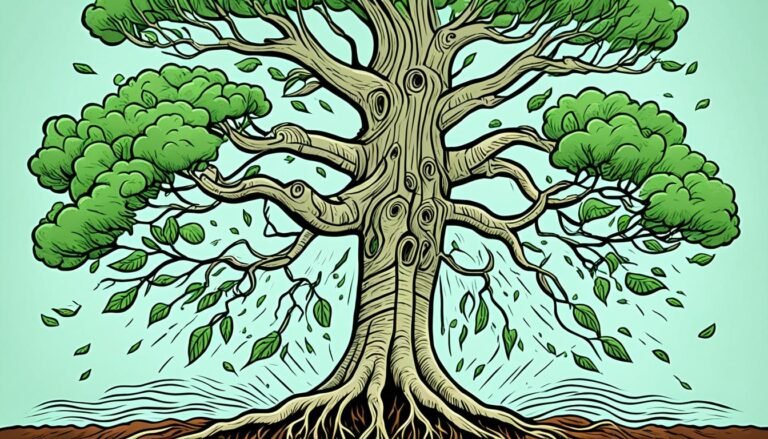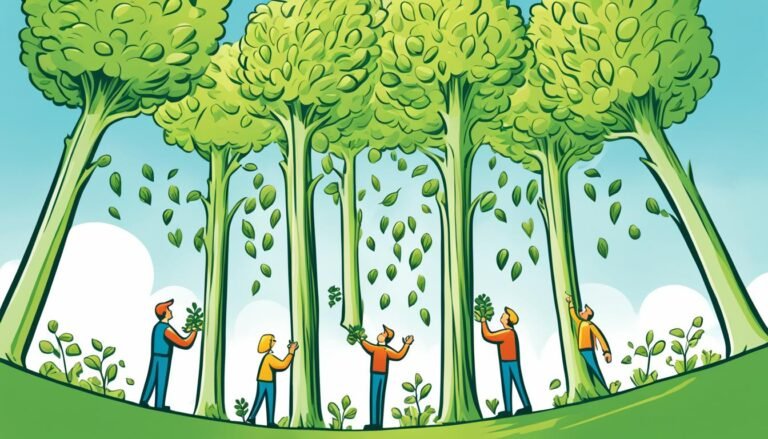Gratitude as a Way of Life: Transforming Perspectives and Fostering Contentment
“Gratitude turns what we have into enough.” – Melody Beattie
Living in a world often focused on what’s missing, embracing gratitude is key. Gratitude as a way of life goes beyond just saying thanks or feeling thankful now and then. It’s a powerful mindset that can change how we see things and make us truly happy every day.
When we make gratitude a habit, amazing things happen. We start noticing the good stuff all around us more. Transforming our perspective, it makes us thankful and helps us see that life is full of good things.
This part looks into how being thankful affects our happiness, connections with others, and how we see the world. We’ll see scientific proof that shows why making gratitude a part of our routine is a good idea. Plus, we’ll share tips on how to add more gratitude to our lives every day.
Key Takeaways:
- Gratitude as a way of life can transform our perspectives and foster a deep sense of contentment in daily life.
- Embracing gratitude allows us to recognize the abundance that surrounds us and appreciate the present moment.
- Scientific evidence supports the benefits of practicing gratitude regularly.
- Practical techniques exist for incorporating gratitude into our daily lives.
- Cultivating a grateful mindset can lead to personal growth, resilience, and a more positive outlook on life.
Understanding the Power of Gratitude
Welcome to the second part of our article on gratitude. We’ll look at how being thankful can make a big change in our lives. This includes making us think more positively and feel better emotionally.
Studies have shown that being grateful daily is amazing for us. It makes us happier, less stressed, and boosts our overall well-being. Seeing the good in things and being thankful shifts our thinking to the bright side. It also helps us bounce back when life gets tough.
“Gratitude is the healthiest of all human emotions. The more you express gratitude for what you have, the more likely you will have even more to express gratitude for.” – Zig Ziglar
When we’re grateful, our minds get better at seeing and enjoying the good stuff. This can lead to personal growth and help us deal with hard times better. Gratitude helps us face challenges with a hopeful heart.
Being thankful doesn’t just make us feel better. It also makes our relationships stronger. By thanking those around us, we build deeper bonds. This creates a kind and thankful space around us.
We’re about to learn more about how science backs up how powerful gratitude is. This will show us how and why it’s worth making thankfulness a key part of our lives. Let’s find out more about the emotional benefits of gratitude.
The Science Behind Gratitude
In the world of positive psychology, research has proven the power of gratitude. It does wonders for our mental health. Being thankful makes our brains release ‘feel good’ chemicals like dopamine and serotonin.
Psychologist Robert Emmons found something interesting. Keeping a gratitude journal for only three weeks can make us much happier and more positive. People who did this slept better, had more energy, and felt less depressed.
Martin Seligman did another experiment. He found that writing a letter of thanks to someone brings us a lot of joy. Even a month later, it keeps us happy and less sad.
This science shows that being thankful really changes our lives. Adding gratitude to our daily routine can bring us a lot of joy. It can really lift our spirits and make us feel good all around.
As we learn more about gratitude, we’ll see how to easily practice it in our lives. In the next part, we’ll check out simple ways to be more thankful each day.
Gratitude Practices for Daily Life
Gratitude impacts our well-being in a big way. It makes us thankful, aware, and happy. When we add gratitude to our daily life, we feel more connected and positive.
1. Keep a Gratitude Journal
Writing in a gratitude journal works wonders. Each day, think about what you’re thankful for and jot it down. It can be something like a pretty sunset, time with family, or a kind stranger’s gesture. Writing these moments down helps us see the good in our life.
2. Express Gratitude to Others
Telling people you appreciate them is another key. Say thanks to someone who has helped you. You could write a note, do a kind act, or just say “thank you.” This deepens our connections and makes us happier.
“Gratitude is the healthiest of all human emotions. The more you express gratitude for what you have, the more likely you will have even more to express gratitude for.”
– Zig Ziglar
3. Practice Mindfulness
Mindfulness makes us truly enjoy the now. It helps us see the good in each day. Spend some time on deep breathing, meditation, or just being grateful for what’s around you.
- Take a mindful nature walk, focusing on the beauty of your surroundings.
- Appreciate the flavors, textures, and nourishment of each bite during meals.
- Engage in daily gratitude affirmations, acknowledging and savoring the blessings in your life.
Gratitude can really change how we see things. It helps us be more appreciative and positive. By living gratefully, we share joy and contentment with others.
Cultivating a Grateful Mindset
Embracing gratitude changes how we grow, tackle problems, and feel. It makes us see the bright side of life and deal with issues in a hopeful way.
Focusing on the Good means looking at hard times differently. Instead of seeing them as blocks, we see them as chances to improve. This mindset helps us find lessons and strength even when things are tough.
It’s also about noticing and valuing the good things, big or small. This small shift lets us enjoy daily moments more. It helps us be grateful for what’s happening now.
“Cultivating a grateful mindset opens the door to personal growth and resilience. It allows us to face challenges with strength, finding gratitude even in the darkest of times.” – Jane Smith
Studies show having a grateful view makes us happier and more satisfied with life. By focusing on positive things, we grow a cheerier mind. This leads to better mental and emotional health.
To be more thankful, try adding gratitude habits to your day. This might be writing in a journal, saying thanks, or being mindful. These actions boost our gratefulness and positive thinking over time.
Practical Tips for Cultivating a Grateful Mindset:
- Keep a gratitude journal: Write down three things you are grateful for each day.
- Express gratitude to others: Take the time to thank someone who has had a positive impact on your life.
- Practice mindfulness: Be present in the moment and appreciate the little things around you.
- Reframe challenges: Look for the lessons and growth opportunities in difficult situations.
- Cultivate optimism: Focus on the positive aspects of life and maintain a hopeful attitude.
By adding these habits to our lives, we can become more grateful. This leads to personal growth, a stronger spirit, and a brighter view of life. Living gratefully improves our happiness and lets us treasure every day.
Gratitude and Relationships
Meaningful relationships are key to our happiness and well-being. Gratitude boosts these connections, making us more thankful. It also helps us feel better emotionally.
Showing thanks is essential for strong relationships. It lets others know we value them. This simple act can bring people closer together and make them feel more connected.
Thankfulness positively affects how we feel. It changes our focus to what’s good in our lives. Gratitude helps us see the value in our relationships and those around us.
“Gratitude unlocks the fullness of life. It turns what we have into enough, and more. It turns denial into acceptance, chaos to order, confusion to clarity. It can turn a meal into a feast, a house into a home, a stranger into a friend.” – Melody Beattie
Gratitude makes relationships more positive. It encourages giving and receiving love. This builds a cycle of happiness in our relationships.
Gratitude strengthens emotional ties. It makes us feel closer and more appreciated. Our relationships become more positive and enriching.
Practicing Gratitude in Relationships:
- Take time each day to reflect on the qualities and actions of your loved ones that you appreciate.
- Share your gratitude openly and regularly with your partner, family members, close friends, and colleagues.
- Write heartfelt thank-you notes or letters expressing your gratitude for specific acts of kindness or support.
- Show appreciation through small gestures, such as making their favorite meal or offering a heartfelt compliment.
- Practice active listening and empathetic communication to convey your genuine interest and gratitude for their presence.
- Participate in activities that promote quality time, fostering a deeper sense of connection and gratitude.
Gratitude strengthens our emotional well-being and our relationships. It’s a reminder to appreciate the good in our connections. And it encourages us to cherish those who make our lives better.
Gratitude in the Workplace
In today’s world, work changes fast. Being grateful can change how we work and feel. If we practice gratitude at work, it makes us think positively and feel good. This also helps us work better and be happy.
Embracing a Positive Mindset
Gratitude makes us see work in a good light. It makes us focus on the good things at work. This makes us happier with our jobs and more creative. It also helps us solve problems better.
Boosting Emotional Well-being
Being thankful at work makes us feel better emotionally. It helps us like our co-workers more and feel part of a close team. This makes us less stressed and happier with our jobs.
“Gratitude is not only the greatest of virtues but the parent of all others.” – Marcus Tullius Cicero
Fostering Team Collaboration
Being grateful helps teams work better together. When we thank each other, it builds trust and respect. This makes our jobs easier and our team’s work better.
Promoting Optimism and Engagement
Gratitude at work makes us hopeful and involved. It makes us look for ways to improve and celebrate what we achieve. This makes us want to do our best and feel good about our jobs.
By encouraging gratitude at work, organizations become places of appreciation. They value their employees more. This makes people happier at work and their teams do better. It’s good for everyone.
Gratitude and Mental Health
Gratitude is more than just saying thanks. It helps our mental health and makes us feel happier. It teaches us to see the good in life. Studies show being grateful often brings us a lot of mental health benefits.
When we’re thankful every day, we stop focusing on the bad. We start noticing and loving the good things in our lives. This change makes us feel better and happier. We begin to feel like we have so much and are happy with it.
Gratitude also changes our way of thinking. It makes our brains look for good things. By being thankful for what we have, we see more positive stuff. This makes us mentally stronger. It helps us face problems with a positive attitude.
Keeping a gratitude journal is a great idea. Writing what we’re grateful for each day boosts our mood. It can make us feel better. Also, saying thanks to people makes our relationships stronger and makes us feel good.
Dr. Robert A. Emmons’ study showed something interesting. People who wrote thankful letters felt happier. They had better mental health and life satisfaction. This shows how much saying thanks can do for our relationships.
“When we are grateful for the good in our lives, we invite more positivity and joy to enter our hearts. Gratitude is a powerful force that can transform our perspective and enhance our emotional well-being.”
Being thankful can really help our mental health. It reduces feelings of sadness and stress. It makes us feel better about ourselves. Focusing on what we’re lucky to have helps us forget about the bad stuff.
To be more grateful, we need to practice. It’s about daily choices and changing how we think. By making gratitude a habit, we get to enjoy the benefits it brings. It helps us feel good about our lives.
Overcoming Challenges in Cultivating Gratitude
Choosing to live gratefully brings many good things. But, getting there isn’t always easy. Yet, if you stay aware and keep trying, you can make gratitude a habit. Here are some tips to guide you:
1. Personal Growth:
Sticking with personal growth by being grateful might be tough. But, remember how powerful gratitude is. Think about how it betters your life and helps you grow. Keep in mind that learning gratitude is a journey.
2. Resilience:
Staying positive during tough times can be hard. Using gratitude to see the good in bad situations helps you bounce back. Focus on the lessons and growth these times offer. Be thankful for the strength these times build in you.
3. Mindfulness:
Making time for mindfulness can be challenging. But, you can fit it in by pausing to enjoy the moment, like taking a deep breath. This helps you appreciate life’s simple joys.
- Gratitude Journal: Writing in a gratitude journal daily helps you notice the good things in life. This keeps you aware and thankful.
- Gratitude Rituals: Create habits that inspire gratitude, like a thank-you prayer before meals or thinking of good things before sleep.
- Accountability Partner: Having someone to talk to about your gratitude journey can be very helpful. Share your highs and lows with this person.
Remember, growing in gratitude takes time and effort. Go easy on yourself. See challenges as ways to get stronger. Keep working on making gratitude a part of who you are.
Conclusion
We’ve looked at how powerful gratitude can be as a lifestyle. It transforms how we see things and makes us happier. When we’re thankful, we feel better and our relationships improve.
Daily gratitude tasks, like writing in a journal and thanking people, help. They make us able to see good even when times are hard. This helps us stay positive and deal with problems better.
Gratitude benefits us at work and for our mental health. It makes us feel good, see the bright side of things, and stay mentally fit. Even when life is tough, staying grateful through mindfulness can help.
Gratitude can change everything for us. It makes us see the goodness around us. Enjoying the little things makes life brighter and more fulfilling.








